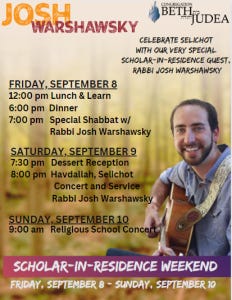The Birth
Nitzavim/Vayeilech 5783 - Today the world is pregnant with possibility
Hayom Harat Olam - Rabbi Josh Warshawsky featuring the Chaverai Nevarech Band
“Today the world is pregnant with possibility. Today all of creation stands in judgment.” On Rosh Hashanah each year we say this line after every set of shofar blasts. It may look more familiar in the Hebrew: “הַיּוֹם הֲרַת עוֹלָם - הַיּוֹם יַעֲמִיד בַּמִּשְׁפָּט כָּל יְצוּרֵי עוֹלָמִים” This year on the first day of Rosh Hashanah that moment will look different, for we will be saying these words after silence - the shofar is not traditionally blown on Shabbat. How can we feel the awe and grandeur of the day without this iconic literal wake up call? I like to believe this provides us with a powerful opportunity - how will we center and wake ourselves up when there is no sound here to do it for us?
Rosh Hashanah is unique among beginnings on the Jewish calendar. We celebrate the new month (Rosh Chodesh) every month with fanfare and Hallel. We even precede Rosh Chodesh with an announcement on the Shabbat beforehand where we proclaim the exact day (or days) when Rosh Chodesh will occur (this Shabbat ritual is called mevarchim chodesh - blessing the new month). But Rav Shmuel Bornsztain (1855-1926 Poland) notes that for the month of Tishrei (the month we are about to enter), we do not announce the month. Why? He writes,
כִּי זֶה שֶׁמְּבָרְכִין הַחֹדֶשׁ הוּא לְהַמְשִׁיךְ מִקְּדֻשַּׁת הַשַּׁבָּת עַל הַחֹדֶשׁ. וְהִנֵּה בְּרֹאשׁ הַשָּׁנָה אָנוּ אוֹמְרִים: זֶה הַיּוֹם תְּחִלַּת מַעֲשֶׂיךָ זִכָּרוֹן לְיוֹם רִאשׁוֹן, הַיְנוּ: כְּמוֹ תְּחִלַּת בְּרִיאַת הָעוֹלָם שֶׁלֹּא בָּאָה עַל יְדֵי שׁוּם הִתְעוֹרְרוּת, שֶׁהֲרֵי לֹא הָיָה מִי שֶׁיְּעוֹרֵר וְלֹא הָיָה לָהּ כָּל הֶמְשֵׁךְ מֵהַשַּׁבָּת הַקּוֹדֶמֶת, שֶׁהֲרֵי לֹא הָיְתָה שַׁבָּת קוֹדֶמֶת לָהּ. "
Because mevarchim chodesh is meant to continue/spread the holiness of the Shabbat onto the upcoming month. And behold on Rosh Hashanah we say, “This is the day of the beginning of your creation, remembrance of the very first day.” That is to say, just as the creation of the world did not come about through any particular awakening, for there was no one to awaken it and there was no previous Shabbat from which to “continue”/receive the spread of holiness, for there was no previous Shabbat at all!
We’re going back to the very beginning! And if it truly is the beginning, then nothing came before it. What does that mean for us practically?
וְזֶה לִמּוּד לְאָדָם שֶׁיַּתְחִיל לְגַמְרֵי מֵחָדָשׁ, כְּאִלּוּ הַיּוֹם נוֹלַד "וְלֹא תִזָּכַרְנָה הָרִאשֹׁנוֹת וְלֹא תַעֲלֶינָה עַל לֵב
And this is to teach human beings that they should really start anew, as if they are reborn, as it says in Isaiah, “For behold! I am creating A new heaven and a new earth; The former things shall not be remembered, They shall never come to mind (Isaiah 65:17).”
What would it be like to give ourselves one moment to visualize a world in which we were actually able to start anew? What would that world look like?
We have to give ourselves the opportunity and the permission to start anew. This teaching opened up a new understanding for me in the words of this particular prayer, Hayom Harat Olam. If today is the very beginning of the world and today is the day all of creation is going to be judged, then how can we not be judged favorably today? It’s day one! This isn’t to say we should forget about all of our mistakes and not try to make amends. Rather, in this season of repentance and reflection, what would it be like to give ourselves one moment to visualize a world in which we were actually able to start anew? What would that world look like? It would be filled with hope and possibility! Now, how can we get as close to that as possible today, tomorrow, and in the year to come?
Shabbat Shalom, and if you’re in the Chicago area this weekend, join us for a wonderful Shabbat and Selichot concert at Beth Judea in Long Grove!
Josh


